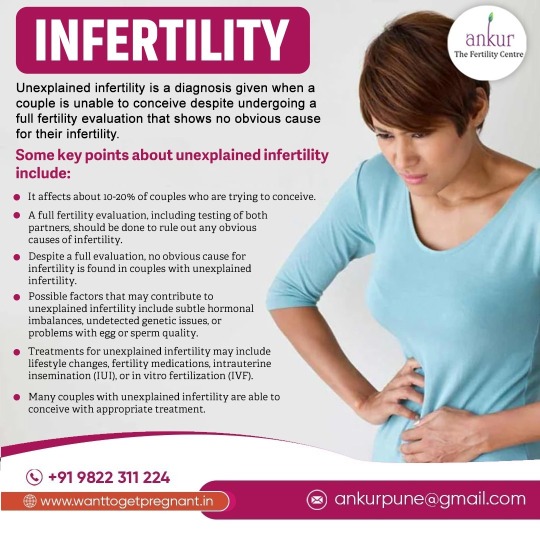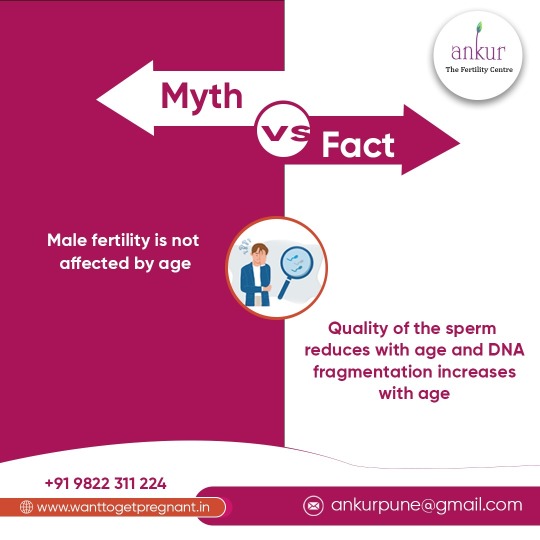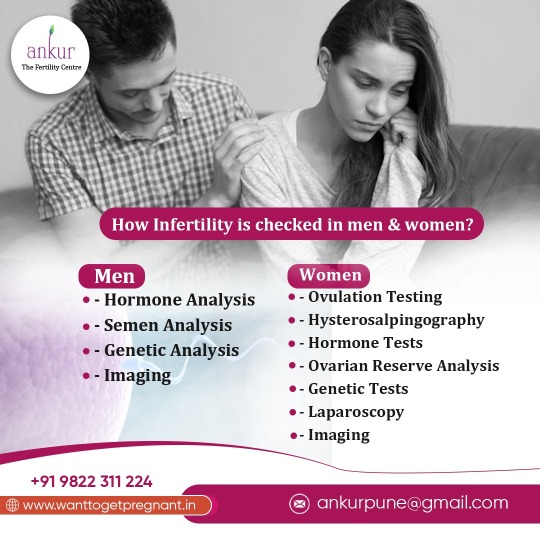Text
https://www.wanttogetpregnant.in/
Best Gynecologist in Yerawada/Shivaji Nagar | Infertility Doctor in Yerawada/Shivaji Nagar | Dr. Vaishali Chaudhary
#gynaecologist#pregnancy#pregnantwoman#maternityhospital#normaldelivery#painlessdelivery#gynaecologicalendoscopy#gynecologistinshivajinagar#endoscopy#gynaecologicalendoscopybenefits#Shivajinagar#pune#endoscopybenefits#gynaecology#gynaecologyendoscopy
0 notes
Text
Debunking Myths about Birth Control

Introduction
Birth control is a crucial aspect of women's reproductive health, allowing them to make informed choices about their family planning and overall well-being. However, numerous myths and misconceptions surround various birth control methods, leading to confusion and hesitation among women. In this blog post, we will debunk some common myths about birth control, providing accurate information to help women make informed decisions about their contraceptive choices.
Myth 1: Birth Control Causes Weight Gain
One prevalent myth is that birth control causes weight gain. While some women may experience slight weight fluctuations when starting a new contraceptive method, there is no substantial evidence to suggest that birth control directly leads to significant weight gain. Hormonal contraceptives might cause fluid retention in some individuals, but this effect is generally temporary and should not be a major concern.
Myth 2: Birth Control Leads to Infertility
This is a commonly misunderstood myth that birth control can cause permanent infertility. The reality is that most contraceptive methods, especially pills, patches, or intrauterine devices (IUDs), are reversible. Once a woman decides to discontinue her chosen birth control method, her fertility typically returns to normal within a short period. However, some pre-existing fertility issues may coincide with contraceptive discontinuation, leading to misconceptions about birth control causing infertility.
Myth 3: Contraceptives Are Only for Birth Control
While preventing unwanted pregnancies is one of the primary purposes of contraceptives, their benefits extend far beyond that. Many birth control methods offer additional health benefits, such as reducing the risk of ovarian and endometrial cancers, managing menstrual irregularities, and alleviating symptoms of conditions like polycystic ovary syndrome (PCOS) and endometriosis.
Myth 4: Natural Methods Are Just as Effective as Modern Contraceptives
Some individuals believe that natural contraceptive methods, such as tracking menstrual cycles or withdrawal, are as effective as modern contraceptives. However, it's essential to understand that natural methods have higher failure rates compared to hormonal or barrier methods. Modern contraceptives, when used correctly and consistently, offer higher efficacy in preventing unintended pregnancies.
Myth 5: Birth Control Causes Severe Side Effects
Concerns about potential side effects often deter women from using birth control. While it's true that some women may experience side effects, they are generally mild and transient. Common side effects might include mild nausea, breast tenderness, or irregular bleeding during the initial adjustment period. However, severe complications are rare, and most women can find a suitable birth control method with minimal side effects by consulting with their healthcare provider.
Myth 6: Teens Shouldn't Use Birth Control
There is a misconception that providing access to birth control encourages teenagers to engage in risky sexual behavior. On the contrary, studies show that comprehensive sex education and access to contraceptives can help reduce the rate of unintended pregnancies among teenagers. Encouraging responsible decision-making and offering medically accurate information can empower teens to make informed choices about their sexual health.
Conclusion
Debunking myths about birth control is essential for empowering women to make informed decisions about their reproductive health. By dispelling misconceptions, we can foster a healthier and more confident approach to contraception. Consult with Best Gynecologist in Shivaji Nagar- Dr Vaishali Chaudhary to find the most suitable birth control method that aligns with their individual needs, lifestyle, and health considerations.
#gynaecologist#ivf#myths#pregnancy#pregnantwoman#maternityhospital#normaldelivery#painlessdelivery#pcos#pcod#infertilitydoctor#pregnancycare#pregnancytips#gynecologistinshivajinagar#ivfhospital#maternity#infertility#Shivajinagar#birth control#birth control pills#contraceptive pills
0 notes
Text

INFERTILITY in Shivaji Nagar/ Yerawada
To know more
Book appointment with Dr Vaishali Chaudhary
Gynaecologist in Shivaji Nagar
Infertility doctor in Shivaji Nagar
Maternity Hospital in Shivaji Nagar
#gynaecologist#ivf#myths#pregnancy#pregnantwoman#maternityhospital#normaldelivery#painlessdelivery#pcos#pcod#infertilitydoctor#pregnancycare#pregnancytips#gynecologistinshivajinagar#ivfhospital#maternity#infertility#Shivajinagar#pune
0 notes
Text

IVF Hospital in Pune- Ankur Fertility Clinic
In vitro fertilization (IVF) is a complex series of procedures used to help with fertility or prevent genetic problems and assist with the conception of a child.
During IVF, mature eggs are collected (retrieved) from ovaries and fertilized by sperm in a lab.
Consult with Dr. Vaishali Chaudhary
#AnkurFertilityCentre#drvaishalichaudhari#Pregnancy#IVF#Fact#ivfprocedure#IVFSuccess#infertility#happiness#Treatment#Pune
0 notes
Text
https://www.wanttogetpregnant.in/gynaecologist-in-kalyani-nagar/
Gynaecologist in Kalyani Nagar/Shivaji Nagar | Fibroid Treatment in Pune | Dr Vaishali Chaudhary
Dr. Vaishali Chaudhary is the best Gynaecologist in Kalyani Nagar/Shivaji Nagar and also provides Fibroid Treatment in Kalyani Nagar who has best-in-class faculty and experienced staff.
#gynecologist#gynecologistinyerawada @gynecologistinshivajinagar#fibroidtreatment#pcod#pregnancy#maternityhospital#ivf#ivfdoctor#infertility
0 notes
Text
https://www.wanttogetpregnant.in/
#gynaecologistinkalyaninagar#infertilitydoctorinkalyaninagar#maternityhospitalinvishrantwadi#pcostreatmentinkalyaninagar#ivfhospitalinkalyaninagar#highriskpregnancytreatmentinvishrantwadi#fibroidtreatmentinkalyaninagar#shivajinagar#gynecologistinshivajinagar#pregancy#infertility#ivf treatment
0 notes
Text

A man can also be responsible for trouble in conceiving but it's surrounded by misconceptions.
Many people still believe that men can continue to have healthy children throughout their lives. With increasing age, the sperm quality and quantity is affected making it difficult for them to impregnate their partner.
#AnkurFertilityCentre#drvaishalichaudhari#Pregnancy#myth#fact#maleinfertility#infertility#happiness#Treatment#Pune
0 notes
Text
BENEFITS OF YOGA FOR WOMEN
Yoga has numerous advantages for women. It can have a significant impact on your reproductive health as well as other health conditions.
Advantages of Yoga-
Yoga is an ancient and well-established form of exercise and relaxation. It has been done for centuries.
Yoga revitalises and revitalises the body, mind, and soul.
It can have a significant impact on an individual's physical and mental health.
It boosts your confidence and self-esteem by improving your own body image.
This improves your performance in daily life.
One significant advantage of yoga is that it can be done anywhere at a low cost. All that is required is a yoga mat.
How does yoga benefit women?
Yoga has numerous health benefits for women, including sexual health, menstrual pain, PCOS, and pregnancy.
How Yoga affects sexual health?
It has the potential to improve all aspects of sex life, including desire arousal, orgasm, and overall satisfaction.
Yoga and breathing exercises will help reduce stress, which will improve desire and performance as well as the relationship and intimacy.
It can strengthen the core muscles and pelvic floor muscles, which will improve sexual function.
How Yoga Helps in Pregnancy?
Yoga has numerous advantages during pregnancy.
It aids in the improvement of cardiac function by increasing cardiac output.
It strengthens the abdominal and pelvic floor muscles, as well as the core, which aids in pregnancy and delivery.
Breathing techniques are especially helpful in managing labour pains.
They improve blood and oxygen delivery to the baby during contractions and are especially helpful when pushing at full dilatation.
How Yoga helps in PCOS?
PCOS is a metabolic condition.
Insulin Resistance and Obesity PCOS is characterised by resistance and infertility.
Yoga can help with hormonal balance.
It also aids in thhttps://www.wanttogetpregnant.in/e regulation of blood sugar, insulin, and cholesterol levels.
Yoga improves the menstrual cycle and ovulation, which can lead to increased fertility.
It relieves stress, which is common in PCOS patients.
This raises cortisol levels, which is beneficial.
Weight management is an important part of PCOS management, and yoga can help with both weight loss and body toning.
How Yoga helps during Menstrual Cycle?
Menstruation is frequently associated with abdominal cramps, pelvic pain, backache, and thigh and leg pain. Periods can cause nausea, vomiting, bloating, headaches, and fatigue in some women. All of these symptoms can have an impact on one's quality of life and prevent women, particularly young girls, from going about their daily lives.
Yoga can help improve mental health so that you can deal with pain better.
Yoga helps to tone the muscles, reducing and sometimes completely eliminating pain and cramps.
Furthermore, it is simple to do, can be done anywhere, and has no side effects when compared to pain reliever medications, which all have side effects when used for an extended period of time.
#gynaecologist#gynaec#gynec#pregnancy#pcos#pcod#pcostreatment#ivf#highriskpregnancy#infertilitydoctor#gynecologistinkalyaninagar#gynecologistinshivajinagar#pune#drvaishalichaudhary#yoga#benefitsofyoga#pregnancyyoga
4 notes
·
View notes
Text

How Infertility is checked in men & women?
Consult with Dr. Vaishali Chaudhary
#gynaecologistinshivajinagar#ivfhospitalinshivajinagar#fibroidtreatmentinshivajinagar#infertilitydoctorinshivajinagar#gynaecologistinkalyaninagar#ivfhospitalinkalyaninagar#fibroidtreatmentinkalyaninagar#infertilitydoctorinkalyaninagar#pcostreatmentinkalyaninagar#painlessdeliveryinvishrantwadi#maternityhospitalinvishrantwadi#highriskpregnancytreatmentinvishrantwadi
0 notes
Text
How is PCOS diagnosed?
There are numerous tests available to diagnose polycystic ovarian syndrome (PCOS). PCOS can be difficult to diagnose because there are so many symptoms, and you don't have to experience them all to be diagnosed. Few women have the same set of symptoms, and the symptoms can fluctuate throughout your life. The PCOS specialist will begin treatment by discussing your symptoms, current medications, family medical history, and any other medical conditions you may have. Your PCOS specialist may also inquire about recent cycles and weight fluctuations. A physical exam will look for evidence of excessive hair growth, hair loss, insulin resistance, and acne. The symptoms vary from woman to woman. Yet, they have the greatest impact on reproductive and fertility health, as well as metabolic and psychological health. While there is no treatment for PCOS, the good news is that it can be managed. PCOS is primarily a lifestyle condition. We know that lifestyle choices can either increase or improve PCOS symptoms. There are numerous strategies to manage your lifestyle and improve PCOS with the assistance of your PCOS doctor, dietitian, and fitness specialists.
Diagnosis of PCOS:
To be diagnosed with PCOS, the patient must pass at least two of the three PCOS tests listed below:
Periods that are irregular or absent
A blood test or symptoms such as excess facial or body hair growth, hair loss, and acne indicate that there are higher amounts of androgens in the blood (hyperandrogenism)
On an ultrasound, polycystic ovaries are apparent, which indicates that more than 20 follicles are present on one or both ovaries, or the size of one or both ovaries is increasing. If you meet requirements 1 and 2, you do not need an ultrasound.
Ultrasound is not recommended for women under the age of 20 by PCOS experts. It means that irregular periods and hyperandrogenism are required for a PCOS diagnosis.
Before an accurate diagnosis of PCOS can be verified, conditions comparable to PCOS, such as irregular periods or no periods, must be ruled out.
When to get PCOS Treatment?
If you suspect you have PCOS, you should consult a gynaecologist first. Because the signs and symptoms of PCOS might be similar to those of other disorders, it is critical to rule these out before making a PCOS diagnosis. Not all tests are required for every woman; your PCOS specialists will make recommendations based on your symptoms.
#GynaecologistinShivajiNagar#IVFhospitalinShivajiNagar#FibroidtreatmentinShivajiNagar#InfertilitydoctorinShivajiNagar#PCOSTreatmentinShivajiNagar#GynaecologistinKalyaninagar#IVFhospitalinKalyaninagar#FibroidtreatmentinKalyaninagar#InfertilitydoctorinKalyaninagar#PCOSTreatmentinKalyaninagar#MaternityHospitalinVishrantwadi#HighriskpregnancyTreatmentinVishrantwadi#InfertilitytreatmentinVishrantwadi
0 notes
Text
The Dos, the Don'ts and What to Know About Vaginal Health
The vagina needs to be kept clean and healthy just like any other part of the body in order to operate correctly. The vagina is a closed muscular canal that connects the cervix (the opening of the uterus) to the outside of the body, despite the fact that the term "vagina" is commonly used to describe to the entire area below the belt. The vagina is a reproductive and sexual organ; hence its condition is crucial to general health. Thankfully, the vagina takes care of a lot of the maintenance on its own. The purpose of the vagina's millions of beneficial bacteria is to keep harmful ones at bay. Additionally, these beneficial bacteria aid in maintaining the vagina's regular pH level and enabling normal function.
Here are some tips for maintaining the health of your vagina-
Use simple soap to cleanse the vaginal region around the vagina to practice good basic hygiene (the vulva).
Avoid using body washes, scented soaps, or perfumed soaps to wash the vaginal area since these products can disrupt the delicate pH balance of the vagina and even promote the growth of harmful bacteria.
When cleaning up after using the restroom, always wipe from front to back.
How to treat common vaginal infections and irritations
Several medical problems can affect the vagina. These are the most typical
Sexually Transmitted Infections- STIs are sexually transmitted infections that can be contracted through unprotected sex. Chlamydia and Gonorrhea infections are on the rise. Any STI infection can alter the vaginal environment and result in symptoms including itching, redness, or irregular discharge. Regular STI testing is therefore essential, especially for people in non-monogamous relationships. Keep in mind that not all STI infections have evident symptoms!
Medical Conditions- Medical diseases, such endometriosis and pelvic inflammatory disease, can also affect the vagina's ability to function normally. A painful period is the sign of endometriosis that people typically experience. Most often, pelvic inflammatory disease appears right after a STI infection. Both of these illnesses cause symptoms that need to be promptly evaluated by your doctor.
Vaginal infections- Yeast infections and bacterial vaginosis are caused by disruptions in the normal flora of the vagina. This is not a STI. Your doctor should nevertheless soon diagnose them and begin treatment.
UTI- A urinary tract infection can cause pain in the vaginal area even though the urinary tract is not technically a part of the vagina. A course of antibiotics can be used to treat a straightforward UTI.
What is “Normal” for Vagina?
It's common to experience vaginal discharge. Throughout your menstrual cycle, the kind and volume of vaginal discharge will alter, but the following features are normal.
discharge without a recognizable odor
a clear or white discharge
Small amount of discharge
What is “Not Normal” for Vagina?
Anything out of the usual, such as new discharge, irritation, or pain.
A shift in the color or quantity of discharge produced
A shift in the kind of discharge, such as clumpy white discharge
Vaginal odor that is not usual
If in doubt, have it checked out! If symptoms arise that you are unsure of, it is best to err on the side of caution. Make an appointment with your doctor as soon as possible. Vaginal health must not be overlooked. Vaginal health is an important factor of overall health. Use some of the following suggestions to keep your vagina healthy. If you see anything unusual or cause for concern, you should see a Gynecologist
The vagina needs to be kept clean and healthy just like any other part of the body in order to operate correctly. The vagina is a closed muscular canal that connects the cervix (the opening of the uterus) to the outside of the body, despite the fact that the term "vagina" is commonly used to describe to the entire area below the belt. The vagina is a reproductive and sexual organ; hence its condition is crucial to general health. Thankfully, the vagina takes care of a lot of the maintenance on its own. The purpose of the vagina's millions of beneficial bacteria is to keep harmful ones at bay. Additionally, these beneficial bacteria aid in maintaining the vagina's regular pH level and enabling normal function.
Here are some tips for maintaining the health of your vagina-
Use simple soap to cleanse the vaginal region around the vagina to practice good basic hygiene (the vulva).
Avoid using body washes, scented soaps, or perfumed soaps to wash the vaginal area since these products can disrupt the delicate pH balance of the vagina and even promote the growth of harmful bacteria.
When cleaning up after using the restroom, always wipe from front to back.
How to treat common vaginal infections and irritations
Several medical problems can affect the vagina. These are the most typical
Sexually Transmitted Infections- STIs are sexually transmitted infections that can be contracted through unprotected sex. Chlamydia and Gonorrhea infections are on the rise. Any STI infection can alter the vaginal environment and result in symptoms including itching, redness, or irregular discharge. Regular STI testing is therefore essential, especially for people in non-monogamous relationships. Keep in mind that not all STI infections have evident symptoms!
Medical Conditions- Medical diseases, such endometriosis and pelvic inflammatory disease, can also affect the vagina's ability to function normally. A painful period is the sign of endometriosis that people typically experience. Most often, pelvic inflammatory disease appears right after a STI infection. Both of these illnesses cause symptoms that need to be promptly evaluated by your doctor.
Vaginal infections- Yeast infections and bacterial vaginosis are caused by disruptions in the normal flora of the vagina. This is not a STI. Your doctor should nevertheless soon diagnose them and begin treatment.
UTI- A urinary tract infection can cause pain in the vaginal area even though the urinary tract is not technically a part of the vagina. A course of antibiotics can be used to treat a straightforward UTI.
What is “Normal” for Vagina?
It's common to experience vaginal discharge. Throughout your menstrual cycle, the kind and volume of vaginal discharge will alter, but the following features are normal.
discharge without a recognizable odor
a clear or white discharge
Small amount of discharge
What is “Not Normal” for Vagina?
Anything out of the usual, such as new discharge, irritation, or pain.
A shift in the color or quantity of discharge produced
A shift in the kind of discharge, such as clumpy white discharge
Vaginal odor that is not usual
If in doubt, have it checked out! If symptoms arise that you are unsure of, it is best to err on the side of caution. Make an appointment with your doctor as soon as possible. Vaginal health must not be overlooked. Vaginal health is an important factor of overall health. Use some of the following suggestions to keep your vagina healthy. If you see anything unusual or cause for concern, you should see a Gynecologist
#GynaecologistinShivajiNagar#IVFhospitalinShivajiNagar#Infertility doctor in Shivaji Nagar#Infertility treatment in Shivaji Nagar#Normal delivery hospital in Shivaji Nagar#Gynaecologist in Kalyani nagar#High risk pregnancy Treatment in Vishrantwadi#Infertility doctor in Kalyani nagar#Normal delivery hospital in Vishrantwadi#IVF hospital in Kalyani nagar
1 note
·
View note